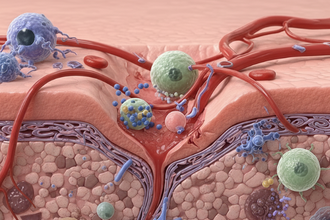
Adapting Your Diet for Optimal Rhinoplasty Recovery with Anti-inflammatory Foods
A nose job, also known as rhinoplasty, is a common beautifying operation that needs proper aftercare for the best outcome. A big part of this aftercare involves what you eat. Eating certain foods can greatly lessen swelling, speed up the healing process and improve recovery overall. Let's take a closer look at how changing your diet to include anti-inflammatory foods can help you recover better from your nose reshaping procedure.
The Role of Diet After Rhinoplasty
What we eat has a key role in helping our body get better following an operation. The right nutrients can lessen inflammation, prevent infections and hasten cell repair work. Meals packed with nature's own swelling reducers -- anti-inflammatories -- especially help control the body’s response to injury, which -- although natural -- could become harmful in excess.
Understanding Inflammation and Its Effect on Recovery
Inflammation, or swelling, is simply how our bodies react when there's been damage or a surgery has taken place. It works by increasing the blood flow and helping our immune system do its job at the affected place. While some inflammation actually aids in healing, too much could cause pain, make swelling last longer than it should and slow down the recovery process overall. By adding anti-inflammatory foods into your meals daily, you can be able to manage this reaction better while helping natural healing processes along.
Foods That Help Control Inflammation After a Nose Job
| Food Source | Omega-3 Content (per serving) | Additional Benefits |
|---|---|---|
| Salmon | 1,800 mg | Rich in high-quality protein and B vitamins |
| Mackerel | 4,580 mg | High in selenium and vitamin D |
| Sardines | 2,205 mg | Packed with calcium and vitamin B12 |
| Flaxseed | 2,338 mg (per tablespoon) | High in dietary fiber and lignans |
| Chia Seeds | 4,915 mg (per ounce) | Excellent source of antioxidants |
| Walnuts | 2,542 mg (per ounce) | Good source of biotin and vitamin E |
Omega-3 Fatty Acids
Omega-3 fatty acids are particularly celebrated for their abilities to reduce swellings naturally - they help calm down inflamed areas while assisting general recovery efforts. We find Omega-3 fatty acids in:
- Fat-rich fish types like salmon
- Mackerel and sardines
- Flaxseed, chia seeds
- Walnuts

Adding these items into your regular menu may go a long way in dealing with post-operation swelling effectively.
Green Veggies
It’s no secret that leafy green vegetables are good for you. They have plenty of vitamins, minerals and micronutrients that help with surgery recovery a lot as well. Here are some greens to put in your meals:
- Spinach
- Kale
- Swiss chard
These leafy foods are packed with nutrients that assist with rhinoplasty recovery.
Berries
Berries also help a lot for healing because they contain antioxidants, especially very powerful antioxidant types called anthocyanins, flavonoids which can offer great help in recovering from a nose job particularly. And in general, eating berries can lower bad stress and pain in your body. The best berries to eat include:
- Blueberries
- Strawberries
- Raspberries
Eating different types of berries is good because it means you're getting more types of these powerful antioxidants, and consuming berries of different colors (eat a rainbow) is usually a good way to get more different types of micronutrients helpful for healing.
Tips on Eating Right For Quick Healing
Plan Your Meals Ahead
It's easier to know what good food you're going to eat if you think about it ahead of time. Writing down what meals will be before they happen makes sure the right ingredients are always there when needed. Here's an easy meal plan idea:
- Breakfast: Greek yogurt mixed with blueberries and sprinkled with chia seeds.
- Mid-Morning Snack: A handful of walnuts.
- Lunch: Salmon served with spinach and kale salad.
- Afternoon Snack: Strawberries mashed together with flaxseed - a delicious smoothie!
- Dinner: Baked mackerel fish served alongside Swiss chard steamed till soft with a side of quinoa.

Drinking Enough Water Is Key!
You need water all the time during recovery, as water helps with a multitude of internal processes in our bodies; moving around nutrients, getting rid of waste, regulating temperature, etc. Make sure you drink enough water every day: aiming for around 8 glasses is usually fine, but it depends on personal hydration needs. Cucumbers, oranges and melons contain a lot of water, so they can be eaten along too. However, plain water can be a better hydration source than foods high in water content.
Stay Away from Foods Causing Inflammation
It's not just about adding foods that fight inflammation to your diet, but also steering clear of the foods that can spark inflammation. These include:
- Sugary foods and drinks
- Processed foods piled with trans fats
- Excess alcohol
Cutting down on these could help keep unwanted inflammation at bay and give your body a better chance to heal itself.
Extra Boost for Body Healing
While real food should be where you get most of your nutrients from, sometimes supplements can cover any nutritional shortcomings. Always check with your doctor before taking any rhinoplasty recovery supplement to ensure it’s safe and right just for you.
Your Guide to Herbal Teas for Less Inflammation
| Herbal Tea | Key Ingredient | Anti-inflammatory Benefits | Additional Health Benefits |
|---|---|---|---|
| Ginger Tea | Gingerol | Reduces swelling and pain | Aids digestion and boosts immunity |
| Turmeric Tea | Curcumin | Strong anti-inflammatory properties | Improves brain function and lowers risk of heart disease |
| Green Tea | Catechins | Reduces inflammation and oxidative stress | Enhances brain function and fat burning |
Looking for a comfy and tasty method to add inflammation-fighting traits into your meals? Look no further, herbal teas have got you covered! Select brews are extra effective in lessening swelling after surgery while aiding the healing process.
Ginger Tea
Ginger is known far and wide for its mighty properties that fight inflammation and boost antioxidants. Swigging down ginger tea can curb swelling and discomfort following nose jobs.

The Tangy Turmeric Tea
Turmeric carries within it curcumin, an element with titan strength against inflammation. You make turmeric tea by having the root or powder boil away in water. A little bit of black pepper steps up the intake of curcumin.
Green Tea
Overflowing with amazing antioxidants such as catechins, green tea succeeds at cutting back on inflammation as well! Regularly savoring this slightly bitter beverage boosts overall well being alongside expedited recovery.
Final Note
Changing what you eat to focus more on foods that fight infection may greatly improve how well you recover after a nose job. Adding nutritious foods like fish, leafy veggies, and berries supports the natural healing powers of your body, leading to an optimal recovery outcome. Always remember: it would be best talking this plan over with your health management professional so they adapt it specifically for you, ensuring efficient recovery progress.
References:
https://pubmed.ncbi.nlm.nih.gov/26947692/
https://www.ncbi.nlm.nih.gov/pmc/articles/PMC7504512/
https://www.ncbi.nlm.nih.gov/pmc/articles/PMC3596046/
https://www.healthline.com/nutrition/eat-the-rainbow
https://www.ncbi.nlm.nih.gov/pmc/articles/PMC6155401/
General Disclaimer: All information here is for educational purposes only and is not meant to cure, heal, diagnose nor treat. This information must not be used as a replacement for medical advice, nor can the writer take any responsibility for anyone using the information instead of consulting a healthcare professional. All serious disease needs a physician.














